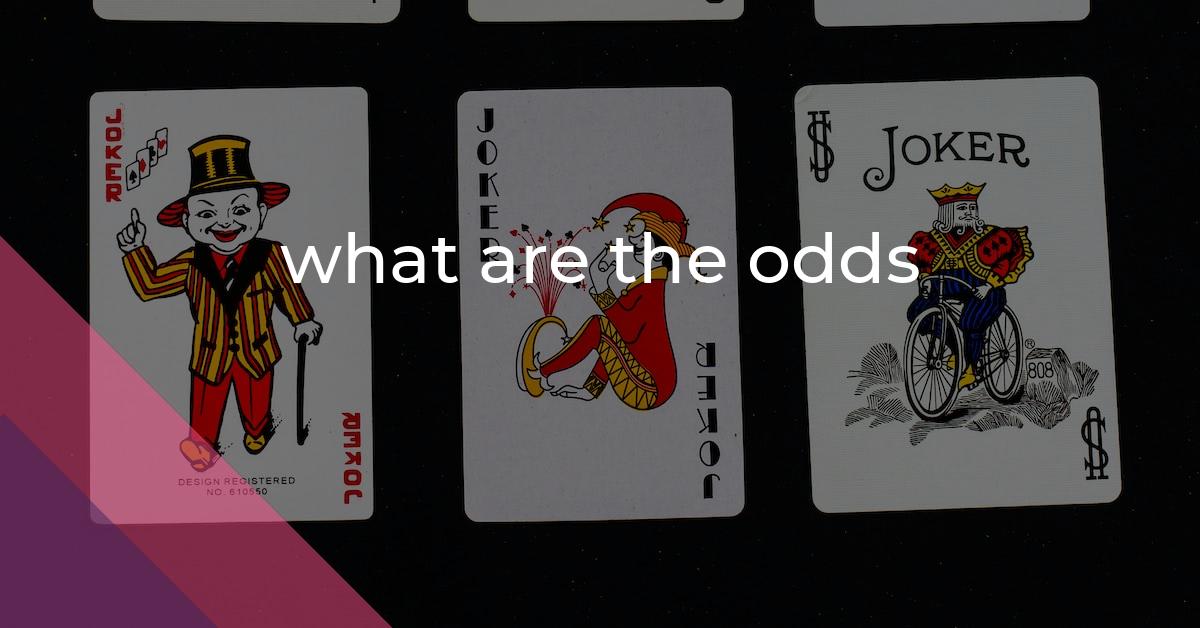what are the odds: Idiom Meaning and Origin
What does ‘what are the odds’ mean?
The idiom "what are the odds" is used to express surprise or disbelief about the likelihood of something happening. It suggests that the chances of that particular event occurring are very low or unexpected.

Idiom Explorer
The idiom "smart chance" is used to express skepticism or disagreement about the likelihood of something happening.
The idiom "say that" is used to express surprise or disbelief when someone makes a statement that is unexpected or hard to believe.
The idiom "roll of the dice" means taking a chance or accepting a situation where the outcome is uncertain and unpredictable.
The idiom "outside chance" means a very small probability or possibility of something happening.
The idiom "of all things" is used to express surprise or disbelief about something unexpected or unlikely. It emphasizes the unexpectedness of the thing being referred to.
The idiom "not likely" means something is improbable or unlikely to happen.
The idiom *not a chance* means there is no possibility or likelihood of something happening or being successful.
The idiom "no chance" means there is no possibility or opportunity for something to happen or be successful.
Coincidental Improbability
The idiom "chances are" shares a similar meaning with "what are the odds." It expresses the probability or likelihood of a particular event happening. When someone says "chances are," they are implying that the odds of the event occurring are quite high or likely. This idiom is commonly used in everyday conversation to convey a sense of confidence or expectation about a given outcome.
For example, if someone asks, "What are the chances of it raining today?" and another person responds with "Chances are it will rain," they are indicating that there is a high probability of rain occurring. This phrase is often used when discussing future events or making predictions based on past experiences or observations.
Similarly, the idiom "long odds" is related to "what are the odds" and conveys a sense of improbability or unlikelihood. When something is said to have "long odds," it means that the chances of it happening are very low or remote. This idiom is often used to express skepticism or doubt about the possibility of a certain outcome.
For instance, if someone says, "The chances of winning the lottery are long odds," they are suggesting that it is highly improbable to win the lottery. This phrase is commonly used in situations where the probability of success or a favorable outcome is considered to be extremely slim.
Lastly, the idiom "a cold day in July" is another related phrase to "what are the odds." It is used to describe something that is highly unlikely or improbable to happen. The expression implies that the event being referred to is so rare or uncommon that it would be as unlikely as experiencing a cold day during the hottest month of the year.
For example, if someone says, "He'll apologize when pigs fly or on a cold day in July," they are expressing their belief that the person in question is highly unlikely to apologize. This phrase is often used to convey strong skepticism or doubt about the possibility of a certain action or event occurring.
"what are the odds" is an idiom that conveys surprise or disbelief at the probability or likelihood of something happening. It is often used in informal conversations to express incredulity or skepticism. The related idioms "chances are," "long odds," and "a cold day in July" all share similar meanings and convey different degrees of probability or improbability. These idioms allow individuals to express their thoughts and feelings about the likelihood or unlikelihood of certain events in a concise and relatable manner.
Example usage
Examples of how the idiom "what are the odds" can be used in a sentence:
- What are the odds that we will both choose the same movie tonight?
- What are the odds of winning the lottery? It's like finding a needle in a haystack!
- She bumped into her old classmate in a crowded city, and they exclaimed, "What are the odds of running into each other here?"
The idiom "what are the odds" is commonly used in situations where the speaker expresses surprise or disbelief at the probability or likelihood of a specific outcome. It often implies that the possibility of the event occurring is unlikely or improbable. The idiom is mainly used to emphasize the unlikelihood of a situation. It can also be used rhetorically to ask a hypothetical question about the probability of something happening.
More "Probability" idioms



